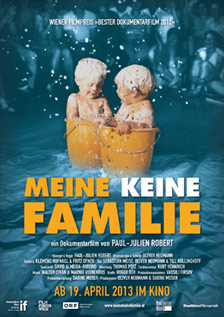
What remains from childhood
Paul-Julien Robert‘s deeply moving and illuminating film „MY FATHERS, MY MOTHER & ME“ by Claus Philipp
In this respect, despite the relatively short distance involved, the autobiographical text on film which Paul-JulienRobertpresentswith „MYFATHERS,MY MOTHER & ME“ is quite dizzying in its richness. It is interesting to speculate how somebody not associated with recent Austrian history and the arts in that country would respond to this narrative about Mühl’s commune at Friedrichshof and the ecstatic communards, with their devotion to the common good: the film actually only provides a limited amount of factual background. At times it appears like a story of dance movements and costumes set in the not so far distant past – remote yet at the same time quite close to us.
But what factual information could be provided if the director and author wasn't even 100% sure who his biological father is/was? His childhood was spent at Friedrichshof, where he seems to have been looked after by so many people that at some point the feeling of security slipped out of sight. Paul-Julien Robert asks his mother about this, and it is astonishing how openly she responds, even though she still doesn't manage to discard the blinkered view. He questions former communards, whose lives after Friedrichshof are in some cases as strange and eccentric as the circumstances under which this community came into being. And then he consults film footage where we can see what it all may have meant: action therapy, the emptying of the self, joint efforts towards the greater whole, which may well have constituted nothing more than a sphere of activity for a huge personal and artistic dictator by the name of Otto Mühl.
Paul-Julien Robert does not elevate himself to the status of prosecutor in all this. Even when he does utter accusations in conversation with his mother and his fathers, this doesn't proceed from the desire to legitimise any pre-judged image but is rather an attempt to get to the bottom of the factors that motivated these individuals. Consequently „MY FATHERS, MY MOTHER & ME“ becomes a documentary novel, a thoroughly affectionate album of childhood, a survey of the abysses and what residue they may have left in an individual – until, in the end, cinema is reflected in cinema:
At the end of the film Robert and his mother sit in the screening room, and rather than showing the screen, the camera points at them. We realise how draining the recently revealed footage is for the protagonists/narrator. We see the mother’s anxious expression. Yes, „MY FATHERS, MY MOTHER & ME“ is (also) a very emotional film, but it does not attempt to dictate how a story – its story – should be read. And in a sense it sketches something far greater than just a chapter in contemporary history: something like the suggestion that we can't simply choose who places us into this world... but our view of the world – that‘s something we can shape for ourselves.


